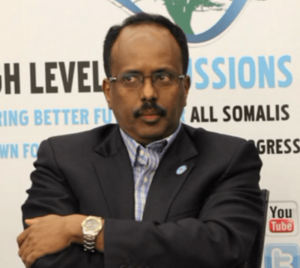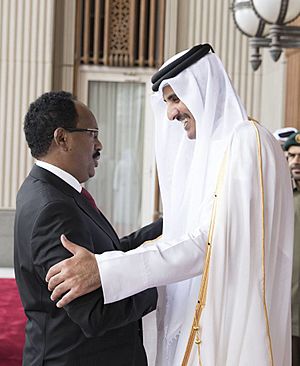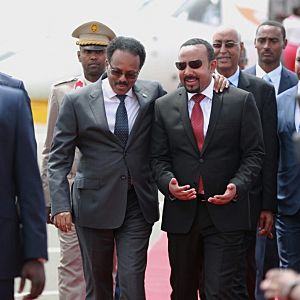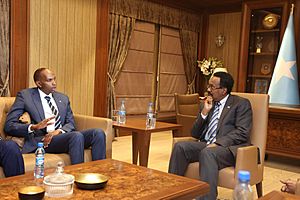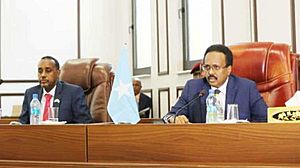Mohamed Abdullahi Mohamed facts for kids
Mohamed Abdullahi Mohamed, also known as Farmaajo, is a Somali politician. He was the president of Somalia from 2017 to 2022. Before becoming president, he served as prime minister for a short time, from November 2010 to June 2011. Mohamed also started and leads the Tayo Party, a political group, since 2012.
Quick facts for kids
Mohamed Abdullahi Mohamed
|
|
|---|---|
|
محمد عبدالله محمد
|
|
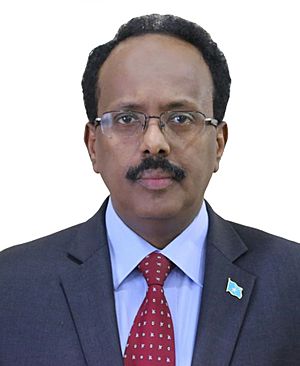
Official portrait, 2017
|
|
| 9th President of Somalia | |
| In office February 16, 2017 – May 23, 2022 |
|
| Prime Minister | Hassan Ali Khaire Mahdi Mohammed Gulaid (acting) Mohamed Hussein Roble |
| Preceded by | Hassan Sheikh Mohamud |
| Succeeded by | Hassan Sheikh Mohamud |
| 14th Prime Minister of Somalia | |
| In office November 1, 2010 – June 19, 2011 |
|
| President | Sharif Sheikh Ahmed |
| Preceded by | Abdiwahid Elmi Gonjeh (acting) |
| Succeeded by | Abdiweli Mohamed Ali |
| Leader of the Tayo Party | |
| Assumed office May 5, 2012 |
|
| Preceded by | Position established |
| Personal details | |
| Born | 11 March 1962 Mogadishu, Somalia |
| Citizenship | Somali American (renounced 2017) |
| Political party | Tayo Political Party |
| Other political affiliations |
Republican (United States) |
| Spouse | Saynab Abdi Moallim |
| Children | 4 |
| Education | University at Buffalo (BA, MA) |
Contents
Early Life and Education
Mohamed Abdullahi Mohamed was born in Mogadishu, the capital city of Somalia. His family belonged to the Marehan clan. His parents were active in the Somali Youth League (SYL), which was Somalia's first political party.
In the 1970s, his father worked for the government in the Department of Transportation. Mohamed went to a boarding school in Somalia. When the civil war began in 1991, he moved to Canada and later to the United States. He became an American citizen.
While living in Buffalo, USA, Mohamed was a member of the Republican Party. He later gave up his American citizenship in 2019.
Mohamed is married to Saynab Abdi Moallim. She was the First Lady of Somalia. They have four children, two daughters and two sons. As of 2019, his children still live in the United States.
Career Before Politics
From 1982 to 1985, Mohamed worked in the Ministry of Foreign Affairs in Somalia. He then served as a First Secretary at the Somali embassy in Washington from 1985 to 1988.
After moving to America, he studied at the University at Buffalo. He earned a bachelor's degree in history in 1993.
Mohamed held several roles in the United States. He was a Commissioner for the Buffalo Municipal Housing Authority from 1994 to 1997. He also worked as a case manager for a lead safety program. From 2000 to 2002, he was a minority business coordinator for Erie County.
From 2002 until 2010, he worked for the New York State Department of Transportation. During this time, he also earned a master's degree in political science from the University at Buffalo. He taught leadership skills at Erie Community College.
Political Journey
Becoming Prime Minister (2010–2011)
On October 15, 2010, Mohamed was chosen to be the new Prime Minister of Somalia. He officially took office on November 1, 2010.
In November 2010, Mohamed announced his new Cabinet. He reduced the number of government positions from 39 to 18. Only two ministers from the previous government kept their jobs.
Government Changes and Improvements
During his time as Prime Minister, Mohamed's government made several changes. They started a system to register security forces using fingerprints. This helped keep track of who was serving.
They also appointed members to an Independent Constitutional Commission. This group worked on creating a new constitution for Somalia. Government officials also shared their personal finances to show honesty. They signed a code of ethics. An Anti-Corruption Commission was set up to watch government activities.
Mohamed's government also made sure that civil servants were paid on time. They approved a budget for 2011. These actions helped him gain support from the people.
Stepping Down as Prime Minister
Mohamed resigned as Prime Minister on June 19, 2011. This was part of an agreement called the Kampala Accord. The agreement aimed to end the 'transitional' phase of the government. After his resignation, Mohamed returned to the United States. He went back to his old job at the New York State Department of Transportation.
Starting the Tayo Party
In early 2012, Mohamed and some of his former Cabinet members started a new political party called Tayo. "Tayo" means "Quality." The party's main goal was to provide services to the people of Somalia. It also encouraged Somalis living abroad to return home and help rebuild the country. Mohamed traveled to different countries to gather support for his new party.
Presidential Elections
Mohamed ran for president in the 2012 elections. However, he was not elected in the first round of voting.
In the 2017 elections, Mohamed ran again. He campaigned as a candidate who would fight against corruption. He won the presidency in the second round of voting. This was a surprise to many experts. He received 184 out of 329 votes.
During his campaign, Mohamed promised to create a new constitution. He also promised to hold "one person, one vote" elections. Another key promise was to work on stopping the group Al-Shabaab.
Presidential Term (2017–2022)
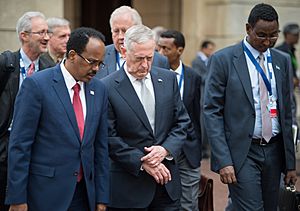
When Mohamed became president, his government was praised by the International Monetary Fund. They liked his financial changes. Diplomats also noted his efforts to reduce corruption in the armed forces.
Relations with Somaliland
In February 2020, Mohamed met with Muse Bihi Abdi, the President of Somaliland. The meeting was arranged by the Prime Minister of Ethiopia, Abiy Ahmed. They discussed the idea of unification, but no agreement was reached. Somaliland declared its independence in 1991. Most of its people were born after this declaration.
Relations with Kenya
In December 2020, Somalia ended its diplomatic ties with neighboring Kenya. Mohamed accused Kenya of interfering in Somalia's affairs. Kenya denied these claims. An investigation by the IGAD found no proof of Kenya interfering.
Support for Ethiopia
In November 2020, Mohamed met with an advisor to Ethiopia's Prime Minister. Mohamed showed support for Ethiopia's actions in the Tigray region. Ethiopia also said it would continue to help Somalia fight Al-Shabaab.
Freedom of the Press
Reports from human rights groups have discussed the state of press freedom in Somalia during Mohamed's presidency. These reports noted challenges faced by journalists. Some journalists were forced to leave the country. Others were killed by various groups.
In 2020, Reporters without Borders noted that efforts were being made to reduce attacks on journalists. They also mentioned that new media laws were not fully up to international standards.
Debt Relief for Somalia
In 2020, Mohamed's government achieved a major success: debt relief. This meant that $1.4 billion of Somalia's debt was canceled. He thanked his cabinet and Prime Minister Hassan Ali Khayre for this important achievement.
Changes in Prime Ministers
Prime Minister Hassan Ali Khaire resigned in July 2020. This happened after a vote of no confidence. He was accused of not delivering on promises, including improving national security.
In September 2020, Mohamed appointed Mohamed Hussein Roble as the new Prime Minister.
Election Discussions
Meetings took place in 2020 to plan for future elections. In September 2020, the government agreed to hold parliamentary elections in December 2020. Presidential elections were planned for February 2021.
However, there were delays and disagreements over how to hold the elections. Talks between the government and regional leaders faced challenges.
Disagreements with Prime Minister Roble
Mohamed and Prime Minister Roble had disagreements during this period. These disputes often centered on the election process and government roles.
In April 2021, the lower house of parliament voted to extend Mohamed's term. However, the upper house disagreed, calling the vote unconstitutional. This led to protests and concerns from the international community. Mohamed later announced that he would not pursue the two-year extension.
In May 2021, Mohamed gave Roble the job of overseeing the elections and ensuring their security.
Later in 2021, disagreements continued between Mohamed and Roble. These included disputes over government appointments and investigations. In December 2021, Mohamed tried to remove Roble's authority over elections. Roble accused Mohamed of trying to stop the election process.
In January 2022, Somali leaders reached a deal. They agreed to complete parliamentary elections by February 25, 2022. This agreement aimed to bring stability after repeated delays.
Awards and Honours
In 2019, at the United Nations General Assembly in New York, Mohamed received the Concordia Leadership Award. He shared this award with Abiy Ahmed, the Prime Minister of Ethiopia, and Isaias Afwerki, the President of Eritrea.
Images for kids
See also
 In Spanish: Abdullahi Mohamed para niños
In Spanish: Abdullahi Mohamed para niños
 | Sharif Bey |
 | Hale Woodruff |
 | Richmond Barthé |
 | Purvis Young |


